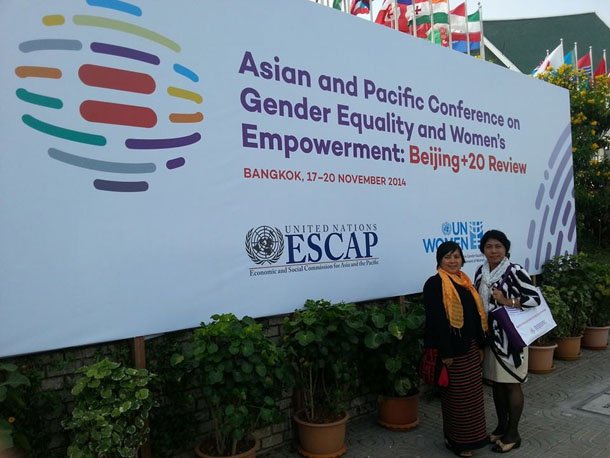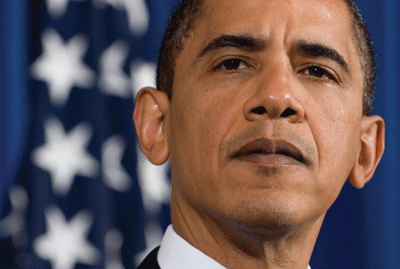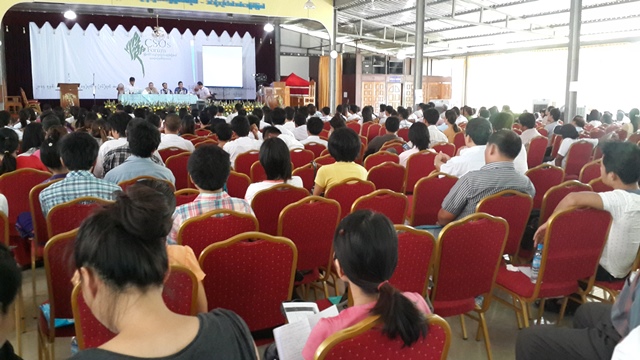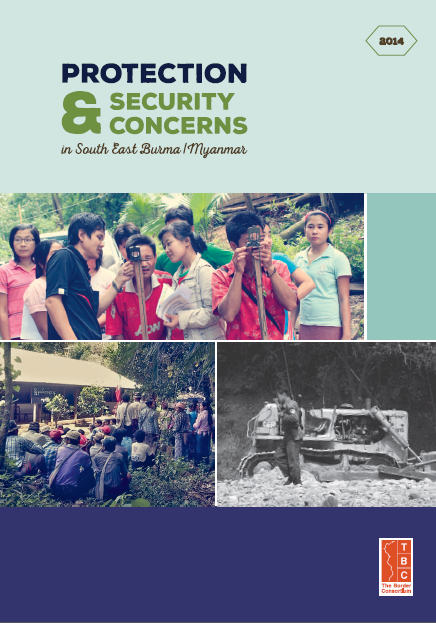Posts Tagged ‘Civil Society Organizations’ (42 found)
Statement on Consultation Organized by Border-based Civil Society Organisations with the Nationwide Ceasefire Coordination Team (NCCT)
On November 22-23, 2014, 42 representatives of 25 border-based civil society organisations (CSOs), working on education, health, media, migrant workers’ rights, refugees, the environment, women’s issues and human rights, held a consultation meeting with the NCCT. This was the first such meeting with the NCCT held formally by a broad grouping of border-based CSOs. […]
• • •Activists Call for Constitutional Change to Empower Women
 Burmese women’s rights advocates added their voices to the contentious debate on amending Burma’s Constitution this week, urging charter changes to promote gender equality during the Beijing+20 regional review forum held in Bangkok.
Burmese women’s rights advocates added their voices to the contentious debate on amending Burma’s Constitution this week, urging charter changes to promote gender equality during the Beijing+20 regional review forum held in Bangkok.
Burmese women’s representatives, both from the government and civil society organizations, as well as exiled women’s activist groups, attended the Asia-Pacific Conference on Beijing+20 in the Thai capital from Monday to Thursday. The Beijing+20 gathering offered a review of Asia-Pacific countries’ progress on women’s empowerment and gender equality. […]
• •Are You Listening, President Obama?
 US President Barack Obama’s made his much-anticipated second trip to Burma last week during the 25th ASEAN Summit, amid growing awareness that the reforms which he so eagerly celebrated during his 2012 trip are quickly unravelling – or being exposed for the stage-managed charade that they are.
US President Barack Obama’s made his much-anticipated second trip to Burma last week during the 25th ASEAN Summit, amid growing awareness that the reforms which he so eagerly celebrated during his 2012 trip are quickly unravelling – or being exposed for the stage-managed charade that they are.
In 2012, it was all too easy to trust the reform process. National elections had been scheduled for 2015, Daw Aung San Suu Kyi had been freed from house arrest and elected to Parliament, political prisoners had been released, a nationwide ceasefire process was underway with the majority of armed ethnic groups, and restrictions on media and civil society had been drastically loosened. And so the US and the international community embraced the reforms.
Yet, last month, in her recent address to the UN General Assembly, Special Rapporteur on the situation of human rights in Burma Yanghee Lee warned of the risks of backtracking. Then, earlier this month, Daw Aung San Suu Kyi labelled the process as “stalled” and remarked that “there have been times when the [US] government has seemed over-optimistic about the reform process.”
Furthermore, there has been a flurry of recent calls from civil society across Burma, directly raising their various concerns about the reform process with President Obama. The Karen Human Rights Group wrote an open letter drawing President Obama’s attention to human rights violations resulting from the ongoing government military presence throughout south-eastern Burma; […]
• • •Protection and Security Concerns in South East Burma/ Myanmar
The peace process in Burma/Myanmar1 is at a critical juncture from which it could evolve into a transformative national dialogue or splinter into a divisive charade. While hopes for substantive and inclusive discussion about structural injustice remain, ongoing militarisation and attacks by the national armed forces2 are undermining the confidence of ethnic stakeholders. This report seeks to highlight the protection and security concerns of conflict-affected communities. […]
• • •Statement of Ethnic Community Development Forum and the Customary Land Protection Committee Concerning Myanmar’s National Land Use Policy (Draft)
On November 1 and 2, 2014 representatives of more than 30 organizations of civil society and farmers networks came together in a workshop to review and analyze the draft national land use policy of Myanmar. […]
• • •“Unsafe Natural Heritage” Photo Exhibition (1-3/11/2014)
Photo Exhibition titled “Unsafe Natural Heritage” was held at the office of Magway Region Farmer Union in Magway from 1st November to 3rd November, 2014, jointly organized by Magway Region Farmer Union and Badeidha Moe Civil Society Organization with the support of Ko Aung Kyaw Kyaw. The photos recorded are from 6 townships that Kyaukphyu-Kumin natural gas pipelines pass through.
• •Kachin Civil Society Groups Rally for Two Jailed IDPs
Kachin civil society groups held a public gathering in Shwezet church in the Kachin State capital Myitkyina on Tuesday to show their support for two Kachin IDPs, Brang Yung and Lahpai Gam, who were arrested by Burma Army soldiers in mid-2012 and allegedly severely tortured. […]
• •Pro-Business or Pro-Poor?
 Making Sense of recently unveiled Draft National Land Use Policy
Making Sense of recently unveiled Draft National Land Use Policy
October 18, 2014 saw the official unveiling by the government of the Republic of the Union of Myanmar of its much-awaited draft national land use policy. Once it is finalized, the new policy will guide the establishment of a new overarching framework for the governance of tenure of land and related natural resources like forests for years to come. As such, it is of vital importance.
This preliminary assessment aims to shed light on the key aspects of the draft policy and its potential implications for the country’s majority rural working poor, especially its ethnic minority peoples, although they are not the only ones whose future prospects hinge on how this policy making process will unfold. […]
• • •Over 650 Myanmar/Burma Civil Society Actors Speak Out on the Reality of the Transition
 The forum titled, “Civil Societies’ Review on Myanmar/Burma’s Transition Process: Prospects for 2015 and Beyond”, held on 15 – 17 October 2014 at the Myanmar Christian Fellowship of the Blind Center in Rangoon, brought together over 650 representatives from 257 organizations and networks from across the country and border areas to discuss and strategize a wide range of key issues currently facing Burma in the context of the recent economic and political reforms since 2011. This is the first forum of this scale to assess the reform and the wide range of problems currently facing Burma.
The forum titled, “Civil Societies’ Review on Myanmar/Burma’s Transition Process: Prospects for 2015 and Beyond”, held on 15 – 17 October 2014 at the Myanmar Christian Fellowship of the Blind Center in Rangoon, brought together over 650 representatives from 257 organizations and networks from across the country and border areas to discuss and strategize a wide range of key issues currently facing Burma in the context of the recent economic and political reforms since 2011. This is the first forum of this scale to assess the reform and the wide range of problems currently facing Burma.
Despite the hailed “transition to democracy,” exalted particularly by the international community, civil society organizations (CSOs) spoke of the decades old challenges that remain unresolved, the stagnation of the reform process, and new emerging issues, in addition to the need for meaningful inclusion of the voices of civil society, democratic opposition forces, ethnic peoples, women and youth in the reform process.
The forum addressed six core issues; (1) law reform, (2) peace and conflict, (3) media, hate speech and communal violence, (4) Parliament, Government and accountability, (5) economic reform and foreign direct investment, and (6) the international community’s role and involvement, which were discussed under six panel discussions and six workshops. The forum produced a statement that gave concrete recommendations from civil society groups to the Burma Government, United Nations, international governments and international non-governmental organizations (lNGOs) […]
• • •Joint Submission on the Proposed World Bank Group’s Country Partnership Framework (CPF) in Myanmar
We, the undersigned organizations in Myanmar and other countries, respectfully submit these comments to the World Bank Group to inform the development of the Country Partnership Framework for Myanmar. We belong to civil society organizations and ethnic community networks with a focus on human rights, environment, peace and mediation, and good governance with significant expertise and experience in Myanmar […]
• • •











 All posts
All posts